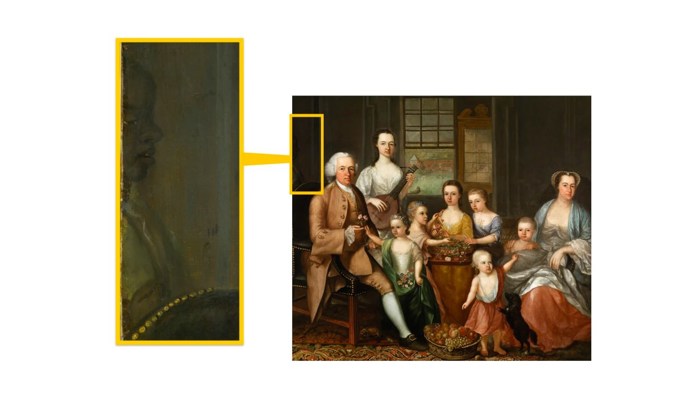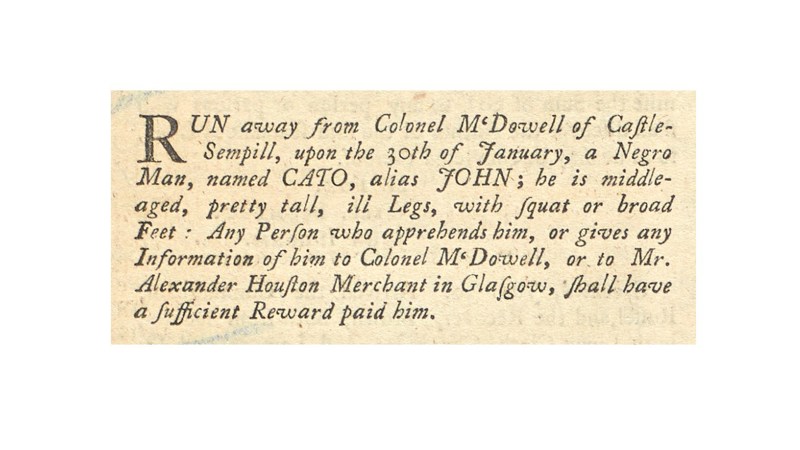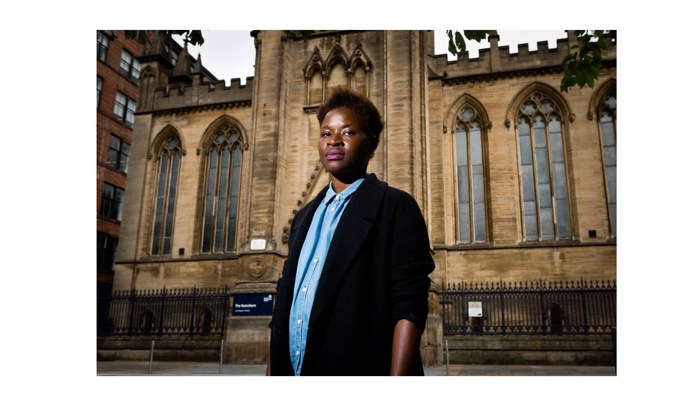
Ghosts: an impassioned call to remember

Runaway Ad, Glasgow Courant, 1 February 1748
https://www.runaways.gla.ac.uk
20th April 2021
A unique, augmented reality experience will soon be available to experience in Glasgow. Audiences will be invited to download a bespoke app, to plug in their headphones, and immerse themselves in this poetic storytelling experience, where a young man in 18th Century Glasgow, leads us on an atmospheric journey of over 500 years of resistance through the streets of the Merchant City down to the River Clyde.
Ghosts is a National Theatre of Scotland production, written and directed by Adura Onashile, alongside a team of artists and researchers. The story at the heart of Ghosts was inspired by adverts placed in newspapers for the capture of escaped enslaved people in Glasgow and the rest of Scotland in the 17th and 18th centuries, many of which are archived in the Mitchell Library in Glasgow. These adverts have been collated in the “Runaway Slaves” project, which has seen the creation of a searchable archive of hundreds of real newspaper advertisements that were published by the City’s enslavers seeking, and often rewarding, the capture and return of the enslaved people who had escaped their service.
‘Who is going to record me? Who will remember?’ asks the main character repeatedly in Ghosts. Who will remember the enslaved people whose forced labour provided the wealth for Glasgow to grow and flourish? Who will remember the Black people who have been integral to this City’s past and present? The questions posed by Ghosts are aimed at the listener, all the inhabitants of the City, and the institutions responsible for recording its memory.
Images


Have we done enough to remember? When I look at the enslaved child in the margins, while his captors take centre-stage, in the so-called ‘Glassford Family Portrait’, I wonder about his life. What name, or names, would he have recognised? Where was he born? Would he have remembered his homeland or his family? Did he ever try to escape his enslavement? What was his fate? But the answers have been forgotten.
Ghosts interrogates our amnesia. It makes us question who and what we choose to remember, and who and what we choose to forget. But the app also forces you to interrogate your surroundings and regularly reminds you that these are still choices we make in the present. Ghosts hits home what James Baldwin once said, “History is not the past. It is the present. We are our history.”
That blurring between the actions of the past and our present is made real by accessing this history through the modern technology of your phone, observing your contemporary surroundings, while hearing a voice from the 18th century. The links between acts of liberation in the past and our ongoing struggles is something Lead Artist, Adura Onashile highlights: “The young man that audiences will follow is our attempt to make real, over 500 years of history, rebellion, resistance and protest. When enslaved Africans liberated themselves from their masters, they started a process that continues today.”
Ghosts also gives life to those who were forgotten. While you walk down streets named after merchants who profited from the enslavement of people – Ingram Street, Glassford Street, Buchanan Street – the narrative remains firmly centred on the enslaved people, rather than the merchants who have countless biographies and portrait. The characters become people with lives, who felt pain, anger and loss, who resisted and fled. It is a powerful assertion of the humanity of enslaved people in the face of all attempts to dehumanise and forget them. As Onashile says:
“We don’t know what happened to him, and history hasn’t afforded him a name or presence, but this is our attempt at saying that he existed, and though we can’t be sure whether he ever found the refuge he was seeking, this is our attempt to put his ghost to rest.”
As memory institutions, museums and archives also have a role in the present to decide who and what we remember and to afford people the humanity that history has deprived them of. In doing that, there is much that can be learned from Ghosts.
Miles Greenwood,
Curator (Legacies of Slavery and Empire)
Ghosts can be downloaded from either the App Store for Apple devices or Google Play for Android devices, between 26th April and 9th May 2021. Price: £4.99
